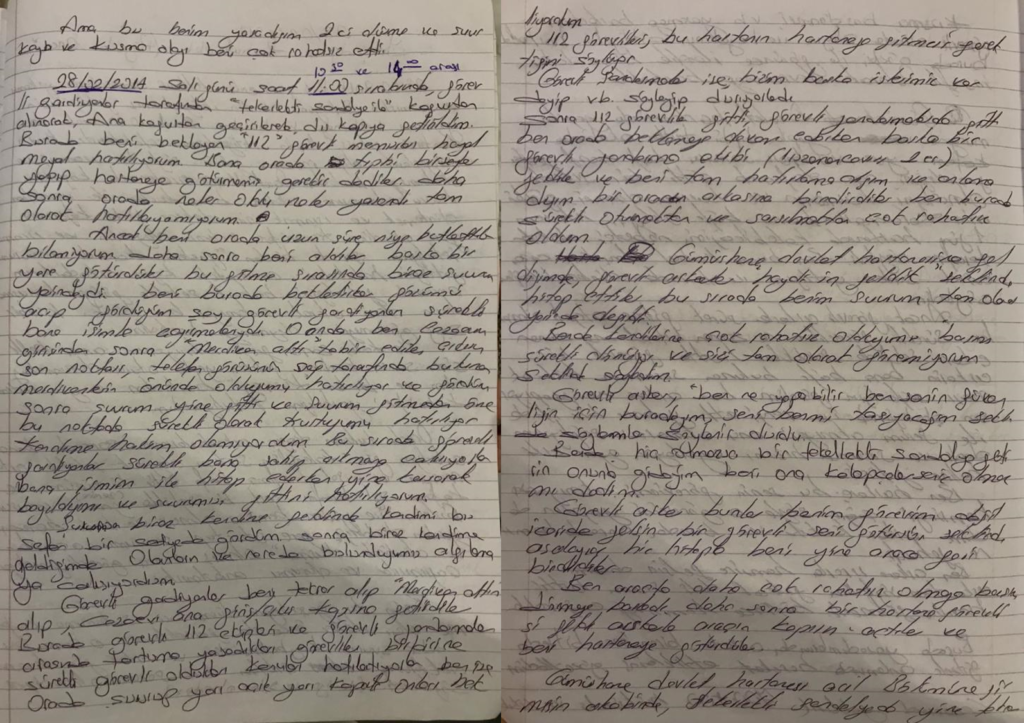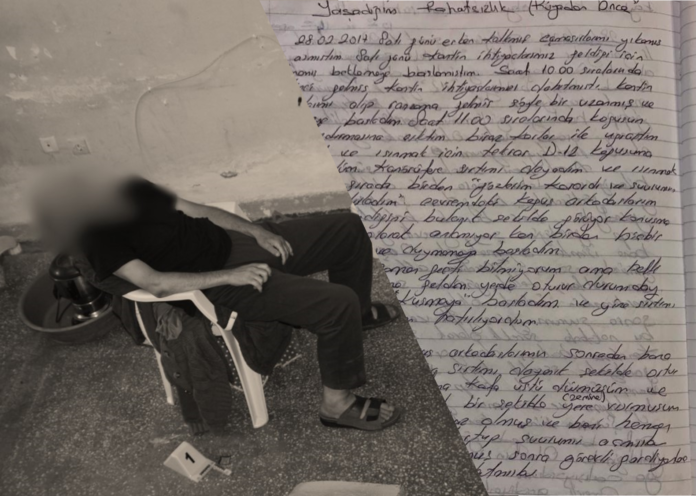The diary of Mustafa Kabakçıoğlu, 44, a police officer who was found dead in a quarantine cell in a prison in the Black Sea city of Gümüşhane reveals his ordeal and documents the misconduct of prison officials.
In his diary, which was published by Bold Medya, Kabakçıoğlu talks about daily life in prison and how he felt about the difficulties he faced. The diary also details an episode in which he was hospitalized, showing how poorly he was treated by prison officials.
Kabakçıoğlu says he was perfectly healthy when he entered the prison. But after a while, being in prison for a crime he didn’t commit started taking its toll psychologically. He was prescribed psychiatric drugs. He started to feel something was wrong with his body. He was becoming dizzy at times.

Photos of Kabakçıoğlu’s lifeless body were published on Wednesday, causing an uproar in Turkey, with thousands of people taking to social media to voice their protests. Kabakçıoğlu was put in a quarantine cell after he had a severe cough on suspicion of having contracted COVID-19. He was alone for the next nine days and was found dead in his cell. A post-mortem COVID-19 test came back negative, which raised doubts about the circumstances of his death.
In an entry dated February 28, 2017 Kabakçıoğlu tells about an episode when he passed out in his cell, hitting his head on the ground. When he regained consciousness, he started vomiting. According to his account, this was the second time such an incident had occurred, but this was worse than the previous one.
Following the incident, emergency medical personnel were called to the prison. But he wasn’t taken to the hospital right away. Kabakçıoğlu recollects how he was kept waiting for reasons he couldn’t understand:
“Prison guards took me and brought to the entrance. Here the emergency medical personnel and the gendarmes had an argument, each reminding the other of their duties. I was there, waiting for them half conscious. The emergency medical personnel said the patient had to be taken to the hospital. Yet the guards kept saying they had other duties to attend to.”
He was then taken to another part of the prison in a wheelchair in a semi-conscious state. He remembers continuing to vomit there and not being able to control his bodily functions. Upon their arrival at the hospital, the gendarmes first tried to make him walk:
“When we arrived at the public hospital, the gendarmes told me to get out. I wasn’t fully conscious at the time. Therefore, I told them I wasn’t well, that I was constantly dizzy. The gendarme said: “What can I do? I’m here for your security. Do you expect me to carry you?”
“Can’t you at least bring a wheelchair and handcuff me to it?” I asked. … Then someone from the hospital came and brought me inside with the help of the gendarme.”
Kabakçıoğlu says he then started to vomit again and only then did the gendarmes realized how critical his condition was and started to act more reasonably. After a checkup by a doctor, he was told that he had head trauma caused by hitting his head on the ground when he fell in his cell. He was given intravenous medication, and he recalls a gendarme trying to adjust the IV drip to make it finish more quickly.
In his diary Kabakçıoğlu gives an approximate timing of what happened and says those who wonder about this shameful episode can see it with their own eyes by watching the CCTV records of both the prison and the hospital.
Kabakçıoğlu was a decorated officer. He was arrested in July 2016 and was summarily dismissed from his job in September 2016 for alleged membership in the Gülen movement. He was sentenced to seven years, six months in prison.
The Turkish government accuses the Gülen movement, a faith-based group inspired by Muslim cleric Fethullah Gülen, of masterminding a coup attempt in July 2016 and labels it a terrorist organization. The movement strongly denies involvement in the coup attempt or any terrorist activity.
Kabakçıoğlu’s donations to a registered charity organization with official non-profit status, witness testimony claiming he went to religious meetings and the ByLock application that was installed on his phone were presented as evidence of membership in the Gülen movement.
ByLock is an encrypted messaging app used in smartphones and was available on Apple’s App Store and Google Play. Turkish authorities claim that ByLock is a communication tool exclusively used by members of the Gülen movement to ensure the privacy of their conversations.
Kabakçıoğlu already had asthma when he entered the prison. Test results revealed that he had diabetes. He started losing weight and reportedly lost 40 kilos.
A petition Kabakçıoğlu wrote to the prison doctor two days before his death was found in his cell. In the petition, he said although he was taking the medications prescribed, he was not feeling any better. He added that he experienced swelling in his mouth and legs and that he had difficulty speaking and walking.
In another entry, Kabakçıoğlu says he doesn’t understand why there is no emergency medical personnel at a prison that houses 700 to 800 inmates. “I wonder if I or someone else experienced a serious medical problem, who would be responsible [for the lack of medical care],” he asks.
In his diary, Mustafa Kabakçıoğlu also complained about the unsanitary prison conditions and his deteriorating health:
“I have been in prison for nothing for nearly seven months. Since I’m imprisoned, I can’t get health screenings and I can’t live a healthy life. We are currently 13 people in a prison ward designed for eight people. We can’t move around or breathe comfortably. I refer those who have subjected us to this treatment to God. … I will take care of those who committed these evil acts against me in the court of God.”
















